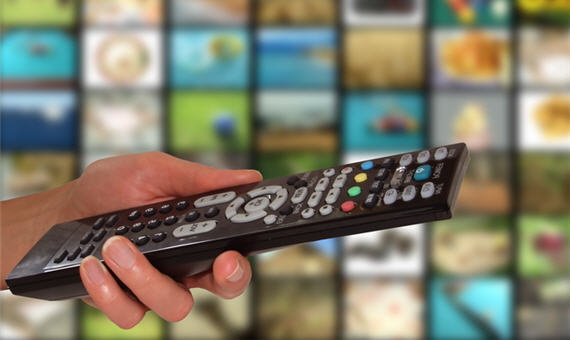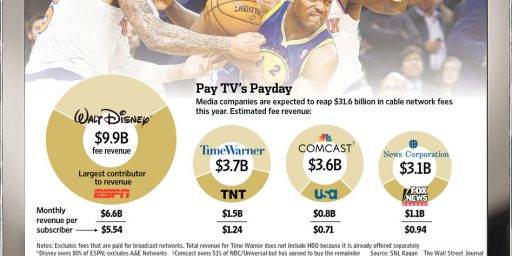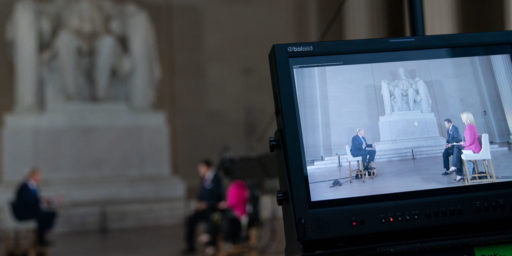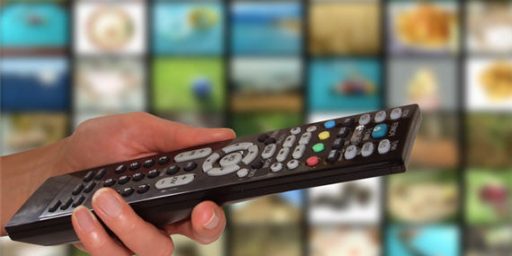Broadcast Networks Say Audience Decline Makes FCC Rules Archaic
The broadcast networks want to operate under the same FCC guidelines as the cable networks. And they should.
The broadcast networks want to operate under the same FCC guidelines as the cable networks. And they should.
Deadline New York (“Broadcasters Tell FCC That Audience Decline Makes Indecency Rules Archaic“):
When they talk to Wall Street, broadcast moguls love to boast about their financial power and unparalleled ability to reach mass audiences. But the FCC heard a different story this week from networks as they challenged the agency’s efforts to minimize indecent programming. Companies say that the rules are too vague, that they clash with broadcasters’ First Amendment rights, and that parents can control what their kids watch. But ABC, CBS, Fox, and NBC also say that rules are archaic because the networks have lost so much cultural clout. Fox says in an FCC filing, “Americans today, including children, spend more time engaged with non-broadcast channels delivered by cable and satellite television, the Internet, video games and other media than they do with broadcast media.” In a separate filing, NBCUniversal observes that “Broadcast TV is not a uniquely pervasive presence in the lives of 21st Century Americans.” Broadcast network affiliates’ total day share of viewing “was just 28 percent in the 2010-2011 television season – compared to the 53 percent viewing share held by ad-supported cable programming networks.” CBS also notes that “the day when a child watching television was almost certain to be watching broadcast television has long since passed.”
They’re right.
The rules made sense thirty, even twenty years ago. Back then, cable television was essentially a platform for showing re-runs from the networks, live sports, and theatrical movies. The handful of original creative shows were mostly R-rated T&A shows that HBO, Cinemax, and Showtime—premium priced providers—aired late at night. Nowadays, the distinction between “broadcast” and “cable” or “satellite” is largely irrelevant. Even the likes of USA Network and A&E are producing their own programming and most of us time-shift our viewing via our DVRs. I frankly don’t know what time most of the shows I watch air and am only vaguely aware of which network airs them. And any show that airs after 9pm is getting watched later in the week at an earlier hour, anyway, so the “family time” concept is irrelevant.
Presumably, there are still families that sit around the living room in the evening watching television together. But there’s plenty of information available now about the language, violence, and sexual content of each showing, including a suggested level of age appropriateness. Just as parents are trusted to determine whether their young children can see a given NC-17 movie at the theater, they can make the same choices at home. And, if parents aren’t parenting, it really doesn’t matter given that most homes are connected to cable or satellite and children who want to watch “naughty” programming can easily find it.
There’s a market for family-friendly television. Most of what’s on television, in fact, conforms to that standard, at least if we don’t hold to 1950s notions of acceptable language and sexual depiction. But that’s just as true on the non-broadcast channels as those nominally shown over-the-air.







Most cable/satellite channels are just as heavily censored as their broadcast counterparts. Watch Discovery or History Channel or MTV or A&E or, well, just about anything, and I guarantee that you won’t hear any of George Carlin’s Seven Words or see even a hint of nudity.
@Peter:
Cursing is not the problem. Media and economic concentration, specially in the state level, is. Without FCC rules, companies would own newspapers, radio and TV stations in the same cities, basically because in most markets where there is no media regulation that´s what happens.
In Brazil there are not only large areas where large conglomerates own ALL important newspapers and TV stations in a region, but they also happen to be politicians. in the US, local news is still pretty important, both on radio and on newspapers.
@Andre Kenji: Ownership concentration isn’t the question at hand, though. Broadcast indecency rules are.
@Gromitt Gunn: True. I read the title of the post, and just glanced the articles. My fault.
We need to add two words to Carlin’s list that I never want to hear on TV again…
Erectile Dysfunction…
@Andre Kenji:
For the record, media rules have lossened to the point where the same company can own multiple radio and TV stations in the same locality. I think Newspaper ownership is also possible, but the newspaper ownership has evolved in such a way that makes the tri-fecta unlikely unless your name is “Murdoch” and we’re talking about NYC.
No libertarian I, but tee vee is one area where the mystical & magical market can be trusted; there’s no better definition of “community standards” than overnight ratings. FCC regs or not, the broadcast networks are guaranteed not to go where audiences & advertisers aren’t ready to follow.
I sort of look at it the other way. With the ubiquity of cable, and the ubiquity of risque material, blood, and smut on cable, how much harm is it that TV is more constrained in what they can put on TV? People who want more blood, sex, curse words, and whatnot now have more ways than ever to get them.
But I guess it doesn’t matter too much either way. As Peter points out, where the FCC doesn’t regulate, advertisers kind of step in.
Any discussion of this should include the fact that the government grants the exclusive use of their bandwidth, worth billions if licensed to the highest bidder, and in return requests that they operate in the public interest. What the networks are asking for is to have none of the restrictions but be allowed to keep the free bandwidth.
I think when it comes to programming network TV has a legitimate complaint about the FCC rules.
Not sure I want to see it go to the extreme (protecting my kids isn’t as big a deal now that half are adults and the other half are close) but I am pretty sure I don’t want every channel with programming comparable in content to some produced by HBO and Showtime.
But cable network channels have found a nice balance and I suspect network TV would focus on this type of programming. I don’t tend to watch a lot of TV shows but almost all the TV shows I watch are produced for a Cable network (USA has a lot of good original programming).
Basically it is time to iminate or at least re define the rules.
@Just Me: But even HBO and Showtime self-regulate in this regard. The more adult-oriented shows are on late at night. It’s strictly PG before 8 Eastern or so. And none of the salacious stuff starts before 11.
I wouldn’t really know what times things come on HBO I have only watched the paid cable shows through Netflix-I am just pretty sure I wouldn’t want to see a steady diet of it on network TV.